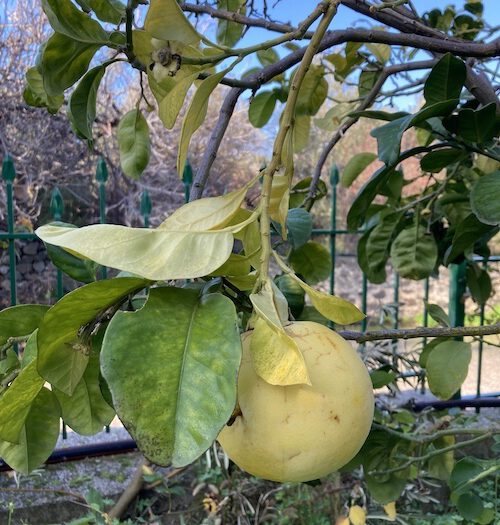(Bergamot orange)
Citrus fruit have become part of our staple food and the Greek kitchen especially cannot do without them. Oranges and lemons are the most known members of this family. They are beloved for their juice. But there are other fruits hanging in the trees, some of them making you wonder what they are.
Greek streets are often decorated with orange trees, their colourful fruit bringing cheer in the dark winter days. I never understood why inhabitants of villages and towns didn’t climb in the trees every day to harvest the fruit. But most of these trees bear bitter oranges (Citrus aurantium) and when they live along busy roads, their skins get impregnated with heavy metals, so they are best left in the trees.
However when the neranzties, as they are called in Greece, grow away from crowded roads, in gardens and rural areas, they do get picked. This Greek queen of the citrus fruit is the basis of lots of delicacies. The English use them for their beloved marmalade, as do some Turks, who serve this jam as a dessert. Orange blossom water is made from the distilled flower petals of the bitter oranges (called anthonero in Greece).
The orange’s taste, most of which is found in the skin, gives an exotic touch to Belgian white beer, Cointreau and Curacao. It’s also the base for the traditional Greek delicacy gliko koutalio, a ‘spoon sweet’: small juicy pieces of fruit are cooked in sugar water, then served on a small plate.
Lesvos has many small and large citrus groves, the sweet orange groves at Thermi and Parakila being the most productive. The trees brighten up many a little garden in quiet villages, or have its fruit slowly rock in the many rural gardens on the island. The colourful fruit is a joy to the eyes, but sometimes you might see something strange: like those lemons with thick lumpy skins. They may be from a citron tree (Citrus medici). Now, I may have seen one on the island, but I do not remember where; because Lesvos is not like Naxos, where you will find plenty of them.
Citron is seen as one of the grandparents of the citrus fruit and probably originated at the foot of the Himalayas in India. When they were introduced in Greece is not certain, but it is thought that the Median apple named by Theophrastus (c. 371 – c. 287 BC) was a citron. When you cut open this bobbled fruit you will find more skin than flesh or juice. The thick skin of the citron is candied and cut into small pieces, used in bread with raisins or sweet cakes (succade). In Greece the thick skins of the citron are also cooked in sugar water and presented as a spoon sweet: kítro glykó.
The name of the fruit, that shares its name with a spice, is the Bergamot orange (Citrus aurantium subsp. Bergamia). Whenever you wonder at the sheer size of some grapefruits, some as big as melons, you will probably be standing in front of a Bergamot tree. The taste of this sweetly perfumed fruit is so bitter that the flesh is considered inedible. Bergamot oranges are mainly loved for their skin, the fruits especially desired for their rich aroma and for the oil that is distilled from their skins. They are used in the perfume industry and give a special taste to the famous Earl Grey tea. They are a speciality in the Italian region Calabria and much revered in Greece where they mainly are candied. You might bump into some on Lesvos.
The wedding present to Hera and Zeus from the goddess of the earth was a wonderful garden where golden apples grew, giving eternal life to whoever ate from them. Zeus and Hera were not very kind to mortals and had the garden guarded by charming nymphs, the Hesperides, helped by a creepy dragon with a hundred heads. One of the many tasks of the Greek hero Hercules who (because he had killed his children) had to perform heavy assignments, was to steal one of the apples. He managed to kill the dragon but I am not sure what happened to the stolen apple. It’s thought that Erin, the goddess of discord, started the Trojan war with one of those famous golden apples.
Not all people believe that the golden apples of the Hesperides were indeed apples. Some say they were quinces, or lemons or oranges, or maybe they were citrons or even Bergamot oranges. So it is possible, on these winter days, when you wander through the Lesvorian landscape, you might think that you have found the famous garden of the Hesperides.











